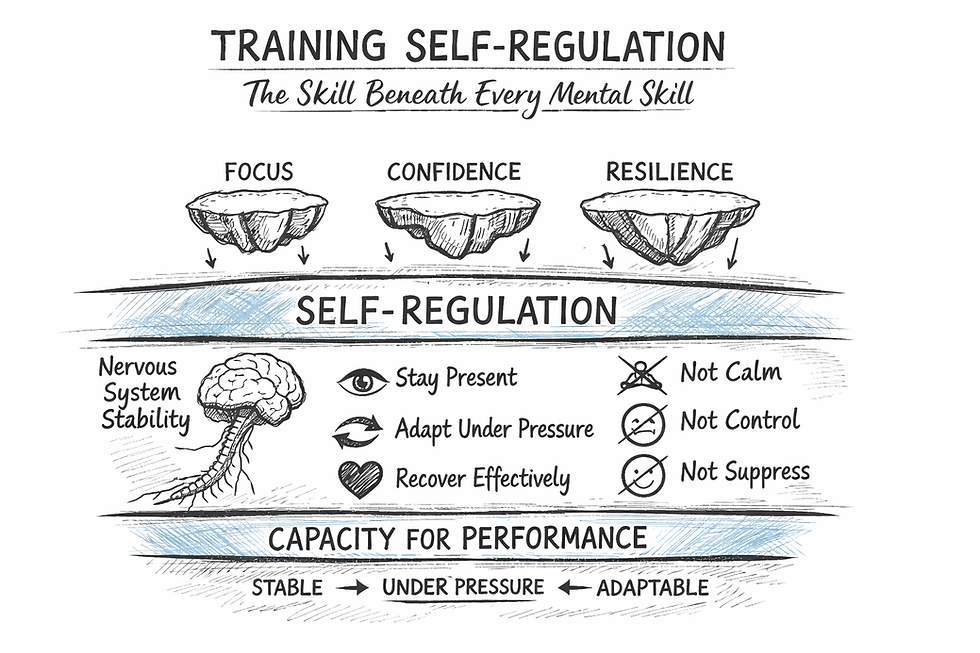The Power of Responding: Mastering Mental Strength in Sports
- Kate Allgood
- Apr 3, 2025
- 4 min read
Updated: Oct 9, 2025
Reacting vs. Responding: What’s the Difference?
Reaction is automatic and instinctual. It happens when your mind and body go into autopilot mode, driven by emotions, stress, or fear. This often results in rash decisions, frustration, or even hesitation.
Responding, on the other hand, is intentional and thoughtful. It's about making a conscious choice rather than being dictated by emotions or circumstances. Responding requires awareness and control, allowing athletes to stay grounded and composed, no matter what’s happening around them.
Why Responding Leads to Peak Performance
Athletes who master the art of responding can navigate high-pressure moments with confidence and clarity. Instead of being overwhelmed by adrenaline or doubt, they take a breath, ground themselves, and make purposeful choices. This mindset shift not only leads to better decision-making but also builds long-term resilience.
When athletes embrace this skill, they can truly thrive under pressure and unlock their full potential, ultimately leading to greater success in their sports endeavors.
Essential Techniques for Training Your Mind to Respond
1. Practice Mindful Breathing
One of the most effective ways to train your mind to respond rather than react is through mindful breathing. This technique activates the parasympathetic nervous system, calming your body and helping you stay present.
Drill: Practice a 4-7-8 breathing technique (inhale for 4 seconds, hold for 7 seconds, exhale for 8 seconds) daily or during stressful moments. Use this technique before games or high-pressure situations to maintain composure.
2. Visualize Pressure Scenarios
Mental rehearsal is key to preparing for high-stress moments. By visualizing potential challenges and your intentional responses, you can build neural pathways that reinforce composure and control.
Drill: Spend 5-10 minutes daily visualizing a specific pressure situation. Mentally rehearse how you will respond with confidence and calmness. Picture yourself breathing, assessing the situation, and executing with intention.
3. Train Your Attention with Meditation
Meditation builds the skill of staying present and detached from reactive thoughts. This essential practice helps you develop the capacity to pause before acting.
Drill: Set aside 10 minutes daily to practice meditation. Focus on your breath and gently redirect your attention back to it when your mind wanders. This exercise helps enhance your ability to remain calm during high-pressure situations.
4. Journal Your Reactions
Reflecting on past performances is crucial for building awareness of reactive tendencies. Journaling allows you to identify patterns and practice reframing your mindset.
Drill: After every competition or practice, write down moments when you reacted instead of responding. Note what triggered the reaction and how you could have approached it differently. Commit to practicing those responses next time.
The Importance of Awareness in Sports Performance
Awareness is the foundation of effective performance. By recognizing your emotions and triggers, you can make better decisions on and off the field. This practice allows athletes to approach challenges rationally rather than impulsively.
Building Emotional Intelligence
Emotional intelligence is an integral part of sports performance. Athletes need to understand their feelings and how these emotions can influence actions. By developing this skill, individuals can react to adversities in healthier ways.
In high-pressure situations, staying calm is essential for making sound decisions. By honing your emotional intelligence, you not only improve your performance but also cultivate a more enjoyable sports experience.
Final Thoughts: Choosing Response Over Reaction
The ability to respond rather than react is a fundamental skill that separates good athletes from great ones. It's not about suppressing your emotions but training your mind to pause, assess, and act with intention. Developing this skill takes time and consistency, but the payoff is monumental: unwavering composure and peak performance, even under pressure.
Start integrating these drills into your routine and notice how your mindset shifts. Remember, it’s not just about mastering your game—it’s about mastering your mind. Own your attention, and master your response to any challenge that comes your way.
-Kate
About Kate
Kate Allgood is educated in the field of applied sport psychology. She holds two Master’s degrees in psychology where she graduated with distinction. After a very successful hockey career, she has spent the past 14 years working one-on-one with high school, college, Olympic, and professional athletes to help them with their mindset, mental performance, and mental skills training. Kate has also been a consultant for professional teams, including the Anaheim Ducks' primary minor league affiliate, the San Diego Gulls, to help the team and players develop their mental game. It's important to note that while Kate has graduate school training in applied sport psychology and general psychology, she does not diagnose or treat clinical disorders and is not a licensed psychologist.
The information provided is not to dispense medical advice or prescribe the use of any technique, either directly or indirectly, as a form of treatment for physical, emotional, or medical problems, without the advice of a physician. The information provided is only to offer information of a general nature to help you in your quest for high performance. If you know or suspect you have a health problem, it is recommended you seek your physician's advice.



Comments